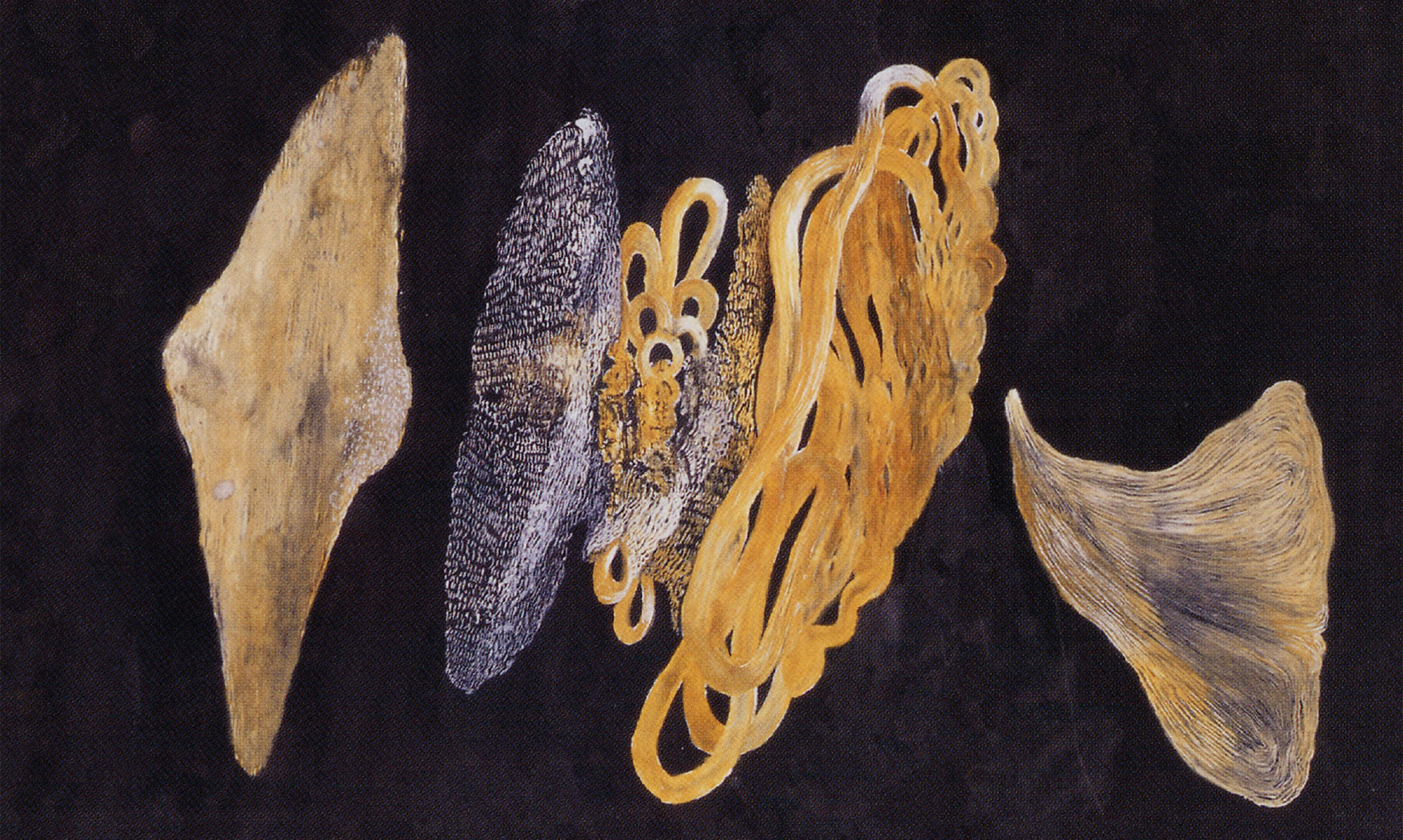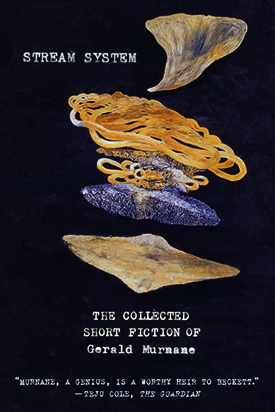Teju Cole says he is “a genius.” The New York Times calls him “the greatest living English-language writer most people have never heard of.” Gerald Murnane is a singular writer finally receiving his due attention. Read here his story “Land Deal,” from the newly released collection of his short fiction, Stream System.
After a full explanation of what my object was, I purchased two large tracts of land from them—about 600,000 acres, more or less—and delivered over to them blankets, knives, looking-glasses, tomahawks, beads, scissors, flour, etc., as payment for the land, and also agreed to give them a tribute, or rent, yearly.
—JOHN BATMAN, 1835
We certainly had no cause for complaint at the time. The men from overseas politely explained all the details of the contract before we signed it. Of course there were minor matters that we should have queried. But even our most experienced negotiators were distracted by the sight of the payment offered us.
The strangers no doubt supposed that their goods were quite unfamiliar to us. They watched tolerantly while we dipped our hands into the bags of flour, draped ourselves in blankets, and tested the blades of knives against the nearest branches. And when they left we were still toying with our new possessions. But what we marvelled at most was not their novelty. We had recognised an almost miraculous correspondence between the strangers’ steel and glass and wool and flour and those metals and mirrors and cloths and foodstuffs that we so often postulated, speculated about, or dreamed of.
Is it surprising that a people who could use against stubborn wood and pliant grass and bloody flesh nothing more serviceable than stone—is it surprising that such a people should have become so familiar with the idea of metal? Each one of us, in his dreams, had felled tall trees with blades that lodged deep in the pale pulp beneath the bark. Any of us could have enacted the sweeping of honed metal through a stand of seeded grass or described the precise parting of fat or muscle beneath a tapered knife. We knew the strength and sheen of steel and the trueness of its edge from having so often called it into possible existence.
It was the same with glass and wool and flour. How could we not have inferred the perfection of mirrors—we who peered so often into rippled puddles after wavering images of ourselves? There was no quality of wool that we had not conjectured as we huddled under stiff pelts of possum on rainy winter evenings. And every day the laborious pounding of the women at their dusty mills recalled for us the richness of the wheaten flour that we had never tasted. But we had always clearly distinguished between the possible and the actual. Almost anything was possible. Any god might reside behind the thundercloud or the waterfall, any faery race inhabit the land below the ocean’s edge; any new day might bring us such a miracle as an axe of steel or a blanket of wool. The almost boundless scope of the possible was limited only by the occurrence of the actual. And it went without saying that what existed in the one sense could never exist in the other. Almost anything was possible except, of course, the actual.
Any god might reside behind the thundercloud or the waterfall, any faery race inhabit the land below the ocean’s edge; any new day might bring us such a miracle as an axe of steel or a blanket of wool.
It might be asked whether our individual or collective histories furnished any example of a possibility becoming actual. Had no man ever dreamed of possessing a certain weapon or woman and, a day or a year later, laid hold of his desire? This can be simply answered by the assurance that no one among us was ever heard to claim that anything in his possession resembled, even remotely, some possible thing he had once hoped to possess.
That same evening, with the blankets warm against our backs and the blades still gleaming beside us, we were forced to confront an unpalatable proposition. The goods that had appeared among us so suddenly belonged only in a possible world. We were therefore dreaming. The dream may have been the most vivid and enduring that any of us had known. But however long it lasted it was still a dream.
We admired the subtlety of the dream. The dreamer (or dreamers—we had already admitted the likelihood of our collective responsibility) had invented a race of men among whom possible objects passed as actual. And these men had been moved to offer us the ownership of their prizes in return for something that was itself not real.
We found further evidence to support this account of things. The pallor of the men we had met that day, the lack of purpose in much of their behaviour, the vagueness of their explanations— these may well have been the flaws of men dreamed of in haste. And, perhaps paradoxically, the nearly perfect properties of the stuffs offered to us seemed the work of a dreamer, someone who lavished on the central items of his dream all those desirable qualities that are never found in actual objects.
It was this point that led us to alter part of our explanation for the events of that day. We were still agreed that what had happened was part of some dream. And yet it was characteristic of most dreams that the substance of them seemed, at the time, actual to the dreamer. How, if we were dreaming of the strangers and their goods, were we able to argue against our taking them for actual men and objects?
We decided that none of us was the dreamer. Who, then, was? One of our gods, perhaps? But no god could have had such an acquaintance with the actual that he succeeded in creating an illusion of it that had almost deceived us.
There was only one reasonable explanation. The pale strangers, the men we had first seen that day, were dreaming of us and our confusion. Or, rather, the true strangers were dreaming of a meeting between ourselves and their dreamed-of selves.
At once, several puzzles seemed resolved. The strangers had not observed us as men observe one another. There were moments when they might have been looking through our hazy outlines towards sights they recognised more easily. They spoke to us with oddly raised voices and claimed our attention with exaggerated gestures as though we were separated from them by a considerable distance, or as though they feared we might fade altogether from their sight before we had served the purpose for which they had allowed us into their dream.
When had this dream begun? Only, we hoped, on that same day when we first met the strangers. But we could not deny that our entire lives and the sum of our history might have been dreamed by these people of whom we knew almost nothing. This did not dismay us utterly. As characters in a dream, we might have been much less at liberty than we had always supposed. But the authors of the dream encompassing us had apparently granted us at least the freedom to recognise, after all these years, the simple truth behind what we had taken for a complex world.
But the authors of the dream encompassing us had apparently granted us at least the freedom to recognise, after all these years, the simple truth behind what we had taken for a complex world.
Why had things happened thus? We could only assume that these other men dreamed for the same purpose that we (dreamers within a dream) often gave ourselves up to dreaming. They wanted for a time to mistake the possible for the actual. At that moment, as we deliberated under familiar stars (already subtly different now that we knew their true origin), the dreaming men were in an actual land far away, arranging our very deliberations so that their dreamed-of selves could enjoy for a little while the illusion that they had acquired something actual.
And what was this unreal object of their dreams? The document we had signed explained everything. If we had not been distracted by their glass and steel that afternoon we would have recognised even then the absurdity of the day’s events. The strangers wanted to possess the land.
Of course it was the wildest folly to suppose that the land, which was by definition indivisible, could be measured or parcelled out by a mere agreement among men. In any case, we had been fairly sure that the foreigners failed to see our land. From their awkwardness and unease as they stood on the soil, we judged that they did not recognise the support it provided or the respect it demanded. When they moved even a short distance across it, stepping aside from places that invited passage and treading on places that were plainly not to be intruded on, we knew that they would lose themselves before they found the real land.
Still, they had seen a land of some sort. That land was, in their own words, a place for farms and even, perhaps, a village. It would have been more in keeping with the scope of the dream surrounding them had they talked of founding an unheard-of city where they stood. But all their schemes were alike from our point of view. Villages or cities were all in the realm of possibility and could never have a real existence. The land would remain the land, designed for us yet, at the same time, providing the scenery for the dreams of a people who would never see either our land or any land they dreamed of.
What could we do, knowing what we then knew? We seemed as helpless as those characters we remembered from private dreams who tried to run with legs strangely nerveless. Yet if we had no choice but to complete the events of the dream, we could still admire the marvellous inventiveness of it. And we could wonder endlessly what sort of people they were in their far country, dreaming of a possible land they could never inhabit, dreaming further of a people such as ourselves with our one weakness, and then dreaming of acquiring from us the land which could never exist.
We decided, of course, to abide by the transaction that had been so neatly contrived. And although we knew we could never truly awake from a dream that did not belong to us, still we trusted that one day we might seem, to ourselves at least, to awake.
Some of us, remembering how after dreams of loss they had awakened with real tears in their eyes, hoped that we would somehow awake to be convinced of the genuineness of the steel in our hands and the wool round our shoulders. Others insisted that for as long as we handled such things we could be no more than characters in the vast dream that had settled over us—the dream that would never end until a race of men in a land unknown to us learned how much of their history was a dream that must one day end.
Gerald Murnane was born in Melbourne in 1939. One of Australia’s most highly regarded authors, he has published ten volumes of fiction, including Barley Patch, The Plains, and A Million Windows, as well a collection of essays, Invisible Yet Enduring Lilacs, and a memoir, Something for the Pain. He is a recipient of the Patrick White Literary Award, the Melbourne Prize for Literature, and an Emeritus Fellowship from the Literature Board of the Australia Council. He lives in Victoria, Australia.

